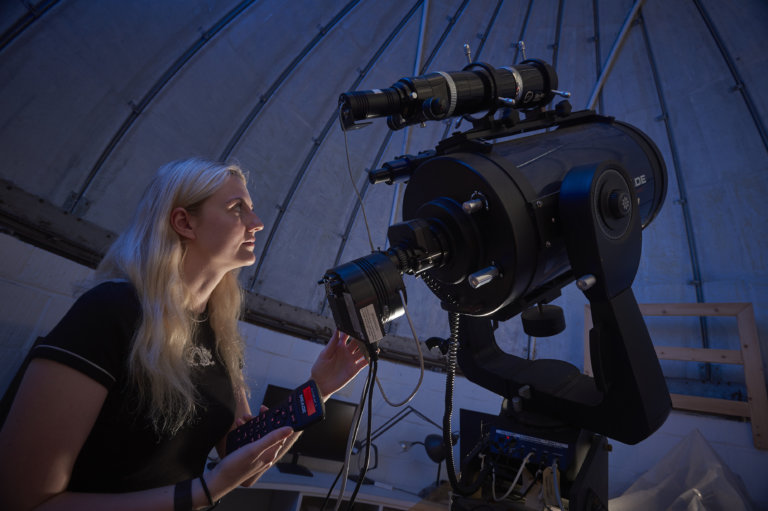
Physics occupies a central position in science and technology, addressing fundamental questions such as “What are the basic building blocks of matter?” and “How did the universe evolve?”
Simultaneously, it serves as the foundation for much present and future technology, tackling pressing and diverse issues, including the development of new energy sources, safer medical diagnostics, high-temperature superconductors, and the creation of ever smaller and faster devices for electronics and telecommunications. Physics sets out to understand the processes, forces and structures of nature.
However, mastering the subject requires more than just passion; it necessitates finding a school with an exemplary physics department. Such a department would feature expert faculty members, state-of-the-art laboratories and resources, numerous research opportunities, small classes, and a challenging curriculum covering both theoretical and experimental aspects.
If you’re keen on pursuing physics, consider the following universities that boast physics departments with successful track records, transforming students into career-ready graduates and leading scientists:
Royal Holloway, University of London
At Royal Holloway, University of London, you’ll find the Department of Physics, one of the major centres for Physics teaching and research in the University of London. Here, you’ll learn from some of the best minds in the field. They have a wide range of expertise — from the fundamental studies of the basic properties of matter (at the lowest temperatures and highest energies) to advanced applications of physics.
During your undergraduate degree, you will be taught by subject experts and be given the chance to join their research groups. They offer a range of undergraduate programmes, including Physics and specialisms in Astrophysics, Physics with Particle Physics, and Theoretical Physics. All programmes are available as a three-year BSc or four-year integrated master’s and accredited by the Institute of Physics.
What sets Royal Holloway apart is its commitment to small-group learning. You’ll benefit from weekly tutorials with specialist researchers in the first two years. You’ll be part of in-depth discussions, hone your problem-solving skills, and develop conceptual understanding. The final year ends with a research project, immersing you in one of the university’s world-class research groups. You can apply for paid research and industrial internships during the summer to gain more practical experience.
All this is paired with access to world-class specialist facilities (e.g. the London Low-Temperature Laboratory, SuperFab nanofabrication facility, and the National Physical Laboratory), dedicated teaching support (teaching laboratories, a teaching astrodome) and specialist support (personal tutors, employability officers, and outreach opportunities). Learn more about the Department of Physics at Royal Holloway here.
University of Aberdeen

Many present day students believe the Department of Physics at University of Aberdeen boast a better physics package than anything on offer at the other Scottish universities. Source: University of Aberdeen
Founded in 1495, the University of Aberdeen is Scotland’s third-oldest university and the fifth-oldest in the UK. It’s home to the School of Natural and Computing Sciences, which has four departments, including the Department of Physics.
With a lineage boasting luminaries like James Clerk Maxwell, the Department of Physics at Aberdeen is a testament to its commitment to excellence in research and teaching. The department creates an optimal learning environment by keeping classes small and relationships close. Modern teaching methods, emphasising practical, “hands-on” knowledge, have earned acclaim, with an external report hailing it as “a better physics package than anything on offer at other Scottish universities.
The Department of Physics comprehensive programmes such as BSc Physics. You have the opportunity to focus entirely on physics or spread your interest to combine it with other subjects. For example, students can pursue joint honours degrees such as BSc Physical Sciences, BSc Mathematics and Physics, BSc Geology and Physics, BSc Computing Science and Physics, and more.
Beyond the classroom, Aberdeen’s Department of Physics is a research powerhouse. Engaged in both experimental and theoretical fields, their research topics span classical domains like general relativity, solid-state physics, and dynamical systems, with a contemporary edge in multi-disciplinary research, particularly applying physics to biology.
Swansea University

Across experimental, applied, and theoretical physics, 97% of Swansea University publications are world leading and internationally excellent. Source: Swansea University
Since its inception in 1920, Swansea University has been a bastion of cutting-edge research, leaving an indelible mark on the global academic landscape. Beyond its rich history of collaboration with business and industry, the university has evolved into a research hub with far-reaching impacts on health, wealth, culture, and well-being.
The School of Biosciences, Geography, and Physics takes pride in pushing the boundaries of the disciplines it is named after. The university cultivates an environment that fosters groundbreaking research and inspires the next generation of physicists. The commitment to excellence is reflected in a curriculum crafted by world-leading experts, covering diverse realms from semiconductors and nanophysics to the enigmatic world of antimatter and quantum fields.
Here, you’ll benefit from a global network of research links and collaborations with institutions worldwide. The university’s affiliation with renowned facilities such as CERN opens doors to exciting projects, providing students and researchers with unparalleled opportunities for exploration.
Swansea offers a spectrum of undergraduate programmes such as BSc Physics, BSc Theoretical Physics, and BSc Physics with Particle Physics and Cosmology. It ensures its graduates are equipped with analytical and problem-solving skills with broad applications across disciplines.
That’s not all. The university’s commitment to cutting-edge physics education is fortified by state-of-the-art science and engineering facilities. These laboratories, equipped with advanced instruments and technologies, serve as the crucible for important experiments. From positron beam and trapping instrumentation to semiconductor fabrication and characterisation, Swansea’s physics facilities underscore its dedication to staying at the forefront of scientific discovery.
University College Cork

The School of Physics in UCC has a very active research programme, located within the School and in Tyndall National Institute — UCC’s largest research institute. Source: University College Cork
Established in 1845, University College Cork (UCC) has been a cornerstone of scientific excellence in Ireland. At the forefront of this academic bastion is the School of Physics, a dynamic hub that seamlessly blends education and research.
UCC’s School of Physics boasts a robust undergraduate programme, drawing in a talented cohort of students eager to explore the intricacies of physics and astrophysics. The school’s commitment to research is evident in its international appeal, attracting post-doctoral fellows and scientists from around the globe. The result? A cosmopolitan melting pot of ideas and innovation, positioning the school as a significant player in advancing scientific frontiers.
Here, you can pursue various undergraduate programmes: BSc Physics, BSc Physics and Astrophysics, BSc Mathematical Sciences & Physics, and BSc Chemical Physics.
The Physics and Astrophysics programme, for example, delves into the vastness of the universe, challenging students to expand their horizons and unlocking a realm of personal and career opportunities. The first year is a gateway to four degree programmes, each tailored to nurture problem-solving skills and provide a robust understanding of basic science. Whether your passion lies in Astrophysics, Chemical Physics, Physics, or Mathematical Sciences & Physics, UCC’s programmes equip you to apply and adapt your knowledge in the workplace.
Upon graduation, the School of Physics propels its alumni into many career opportunities. From tech giants like Amazon and Apple to financial institutions like Bank of Ireland and consulting firms like Deloitte, UCC graduates find themselves in high demand, showcasing the real-world applicability of their physics education.
*Some of the institutions featured in this article are commercial partners of Study International










